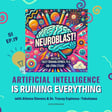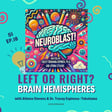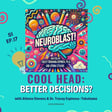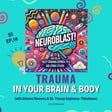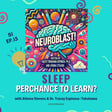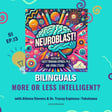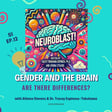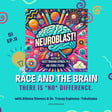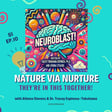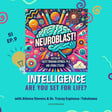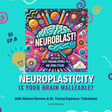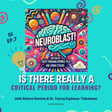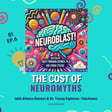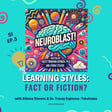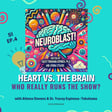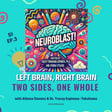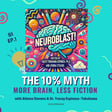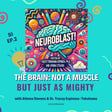Become a Creator today!Start creating today - Share your story with the world!
Start for free
00:00:00
00:00:01

You Are What You Eat! Your Brain is Hungry
This episode of Neuroblast busts the myth that diet doesn't affect brain function. Hosts Athena and Tracey explore how proper nutrition—especially complex carbs, healthy fats, and nutrient-rich foods—directly supports memory, focus, and cognitive health, while debunking the hype around sugar, junk food, and supplements.
Original music by: Julian Starr
Transcript
Introduction to Neuroblast Podcast
00:00:00
Speaker
Hello ! And Neuroblast where we brain myths one neuron at a time.
00:00:24
Speaker
My name is Athena Stevens, the actor, writer, and proud owner of really well-maintained, but hungry brain.
00:00:35
Speaker
and I'm Tracey Tokuhama Espinosa. I teach a course at Harvard University called The Neuroscience of Learning, An Introduction to Mind, Brain, Health, and Education. And I'm international educational consultant.
Does Food Affect Brain Function?
00:00:48
Speaker
And first of all today, Tracy and I, together, even though we're five times on the way, both managing a cold. So you get a special deal today, guys, because there's no telling where we will go with our cold-infected brains.
00:01:07
Speaker
But where we are aiming to go is a myth that your food intake does not in any way affect how your brain works.
00:01:19
Speaker
And this is a particularly interesting myth for me because one of the earliest problems I had when I became an adult was brain fog and trying to figure out what I had to eat, and how much I had to eat, in order think, create, produce, do all the high-level cognitive stuff I wanted to do - as a career.
00:01:52
Speaker
So, Tracy, what is this myth? Why does it exist? Well, I think the main reason this myth exists is that people sort of find a disconnect.
00:02:06
Speaker
Well, number one, people don't think a lot about their brains. Like every once in a while you get a headache and you toss an aspirin at it and then you just, okay, you're conscious that you have a brain there. But people don't really think about thinking happening in the brain. They don't think about feeling. They don't think about all of their
00:02:23
Speaker
bodily functions being managed by their brain, they just sort of live with it, which is kind of interesting. And it's not- so that leads to this further disconnect that what we eat could influence how well we can think.
00:02:38
Speaker
And so people, unless you're, when you are very hungry, do you think, okay, I'm distracted? I- I'm focused on my stomach. I want to eat something. But you don't add on to that the fact that you have lower capability of really good and complex thoughts, but you just don't have the nutrients in you to be able to focus um and have better, high - higher order cognition. So this whole new field now looking at neuro nutrients
00:03:04
Speaker
and how they feed the brain and what it is that we need and use. But at a more basic level, um you br- your brain's using about 20% of all of the caloric intake that you use anyways, that you have anyways. So about 20% of the calories that you're eating are really just being devoted to that one really super hungry organ, the brain.
00:03:27
Speaker
- And the quality of what you eat really affects the quality of how you can think. And so not all calories are created equal. So chips and cola, you know, if that's what you're feeding your brain, you're not going to be, you know, functioning as well as if you eat
Understanding the Gut-Brain Connection
00:03:42
Speaker
more healthy. And so we understand there's a really tight connection there. I guess a third link also between the brain and, um,
00:03:50
Speaker
And what we eat is called the gut-brain axis. So there's a link, very clear link now, between what you eat, how that changes the chemical balances -
00:04:02
Speaker
that go into your brain. So also that influences how you think as well. So there's multiple levels on this ah brain body connection that we really should be paying more attention to.
00:04:13
Speaker
It feels like very often when I was struggling with this, a sugary drink would get me out of my brain fog and get me going again.
00:04:27
Speaker
And It worked if I was desperate and I really needed to, you know, kind of jumpstart my thinking.
The Impact of Glucose on Brain Function
00:04:38
Speaker
Was that completely placebo or is there something to that sugar and that glucose that at least gets it back online, even if you shouldn't be depending on that?
00:04:54
Speaker
Yeah, that and you're absolutely right. It does, you know, in a short term, will get you back online, but the problem is, or the beauty of your brain is, um and your body, is that it's always seeking balance.
00:05:07
Speaker
It's always seeking to be in homeostasis balance, right? And allostatic load is is basically looking at the chemical balances that occur. And when you give yourself a shot of glucose like that,
00:05:21
Speaker
Well, your body then immediately thinks, oh my gosh, how do I pull this back down to balance? So you will then go into a dive afterwards because your body is trying to find this way of finding its own balance again. And so, um yes, you're right. It can initially, you know, help. It's not only a placebo effect. It does actually, you know, do something to sort of kickstart the your mental processes, but you will actually then have a crash after that because your brain isn't going to live, you know, not, not stay in that high state unless you're pumping it, you know, a milkshake, you know, every, every 10 minutes or something like that, but you're not going to do that.
00:06:02
Speaker
So you're going to, your body is going to try to seek its balance again. And it will mean that it's going to pull it back down because it says, wait, this is an overload of glucose here. We need to find a balance. And so you're going to be having these back and forth. So the better thing,
00:06:15
Speaker
is to have um you know more better foods in general for your body. So there's no perfect diet for your brain, but basically the general rule of thumb is what's good for your heart is good for your brain.
Harvard's Updated Dietary Recommendations
00:06:31
Speaker
So what kinds of things can you imagine would be good for your heart that you could also say are are actually good for your brain to include in ah in a good diet for your brain? What would you guess? Well, I want to go off on a question on my own, you know, the stereotypical thing would be fruits and vegetables, clean eating, and then we have this thing called meat
00:06:56
Speaker
that will upset the entire internet when we talk about does your brain need meat and meat being a large source of choline.
00:07:10
Speaker
So let's start, well, what is generally good for the brain, but is every brain different? Yes, and yes.
00:07:21
Speaker
Generally, what's good for the brain is, and what's good for your heart is good for your brain. So that's always a good general rule of thumb. It's very interesting, Harvard re-drew, it's, um you know, the food pyramid we used to have, where you say you have a certain things at the bottom-- the biggest like that the government ever told us? That food pyramid?
00:07:41
Speaker
Well, no, it's actually been drawn as a... a plate, which is really nice. So it sort of divides us up in like a pie chart of sort of where, you know, proportions of things. But what's really um so important to see is that, yes, fruits and vegetables make up the lion's share of things, but also, you know, complex carbohydrates and ah tons of things like nuts, but also getting, um you do need,
00:08:05
Speaker
proteins. And so the idea of having, you know, meat, we used to think that that's the main, our main source there. But if you go into any restaurant these days, it's really wonderful to see that they'll say, and would you like to add a protein to that? And - it's a variety of different things, right?
00:08:20
Speaker
And so we know that there's protein in things that are beyond meat.
Personalized Nutrition and Genetic Metabolism
00:08:25
Speaker
And so we're now seeing different ways of getting those, um, different nutrients into us. But um to get to the second part of your observation, everybody is different. And a ton of that has to do with your genetic makeup in terms of your metabolism and just how fast you process - different types of things, which is really pretty interesting. If you, and maybe you spend some time with some family members um over the holidays or or friends, and you'll see that different people are on different
00:08:55
Speaker
you know, eating schedules, you know, you'll think, okay, we're all going to get up and we're all going to have breakfast together. And you realize that everybody's breakfast is a little bit different, composed of different things or at different times of day.
00:09:07
Speaker
Um, and then - we'll move on to the next meal and you'll think, okay, now it's time for everybody have lunch. And you realize, well, that's not true. About half the people weren't hungry at that point or whatever. And so different people's metabolisms um process these different nutrients at different rates as well and so finding that balance, what what each individual needs is very, very important and understanding yourself, your own body best. Um, you can't tell people that it's wonderful to eat nuts and grains and stuff if people will have allergies to nuts and grains and things, right? So you have to find what's right for you and diets are very, very individualized in that sense, but they are, you know, some there's some very good global parameters of what humans
00:09:48
Speaker
need to function well and I do think the new and revised um Harvard - plate is is actually a pretty good one. I've noticed since September I changed my diet because I started eating as if I had a brain injury.
00:10:10
Speaker
Crazy idea, right? Because cerebral palsy is a brain injury and I went, okay: What would happen if I ate as though I had a brain injury?
00:10:23
Speaker
So that means a lot more meat um and a lot more protein and a lot more choline and a lot more creatine, which we can talk about the rise nootropics here. But, again
00:10:41
Speaker
ah - It made a difference. I don't particularly like meat, and it would be quite easy for me to go days without it. But it is the difference between being able to consistently create and write and put out content and wanting to curl up in a ball and fall asleep.
Nutrients and Brain Health
00:11:09
Speaker
Um, what are we learning about
00:11:15
Speaker
Neurological disorders and diet and nootropics and what we consume somehow giving the brain more energy in the face of illness and disability.
00:11:30
Speaker
There's a ah whole lot of research going on right now in in very, very different areas. And - it's really, we're getting to this space where science is advanced enough, where there's really, you know, fine tooth comb kind of angles, people looking solely, for example, at inflammation and what are things that reduce ah inflammation and throughout your body, including and in your brain tissues and all the rest of that.
00:11:56
Speaker
There's other people who are looking at the way, um I guess to me, the most fascinating thing is combinations of neuro nutrients or micronutrients and how different things trigger each other because of their chemical composition. So how eating, you know, two different things together might be better.
00:12:16
Speaker
so if you're having your peanut butter toast and a glass of milk, you know, how is that different from, you know, having it with orange juice something like that? So people are looking at combinations of foods as well and how they influence each other and the benefits that can be reaped from that.
00:12:33
Speaker
Um, but the one, I think, huge finding that's coming out of a lot of these things is people are making global recommendations to all people that this is the way to go, or this is the supplement you need or whatever
00:12:48
Speaker
And I think that's really dangerous. I think that everybody needs, you know, there was the number one rule of thumb is very much a Socratic lesson of know thyself. Do you know yourself? Do you know your needs best? Do do you know how to keep your homeostasis, your balance the best?
00:13:07
Speaker
And so another good, good rule of thumb. Another basic lesson is as close to the natural source as possible. And so taking tons of supplements is not really the way to go, right? Eating the right foods is is really the right way to go. So finding foods that have those nutrients in them, but you need to know yourself best and what it is that you need in order to function best. So really doing self-study, you know, keeping a little journal, jotting down the things you eat and how much you slept and what really tipped you and what what kept you in a really good space
Signs of Brain Fog and Lifestyle Review
00:13:42
Speaker
that you're saying. For example, you you note when you're most creative and when you seem to be functioning well.
00:13:48
Speaker
But that might not only be the food you're eating. That also is a balance of how well you're sleeping and other kinds of social emotional aspects as well. So there's a lot to take into consideration. It's not just food, but food plays a huge role um in how well your brain can function.
00:14:06
Speaker
I am slightly concerned, particularly with women, that we are not getting the nutrients we need have our best brains.
00:14:19
Speaker
That's a really good observation because most of the research, and that's a huge space that um just just recently, there was a big proposal to to invest a whole lot of new resources into looking at women, women's bodies, women's brains, because most of the research we have is on men's brains and bodies. And so what kinds of things women's you know women really need and what kinds of differences um in those types of um -- there's that but also we we see the quote un- quote ideal woman as eating a green salad and laughing
00:15:03
Speaker
You know, there's no fat. There's no protein. There's still my friend thinking that 27g of protein a day is enough.
00:15:14
Speaker
Wow. Yeah, there's there's that that is, again, something we need to look at what the general recommendations are, but also what each individual needs. And you're right, nobody lives off of just green leafy salads ah alone, although those are very beneficial and complementary to other things. But that alone, um that's another saying from Socrates, right? Everything in moderation.
00:15:37
Speaker
So going on these diets that are just a single type of ah food source is really kind of crazy, extra crazy, right? So the balance between all of the different foods is really what we're after.
00:15:50
Speaker
And I think, you know, you mentioned, um you you said the word nootropics, and I think that that's a really interesting um point that we haven't ah talked about as far as changes, chemical changes in the brain, but there is a lot of cosmetic neurology going on um using, you know, supplements or drugs or things like that. And - that in place of just having a good a diet, um, a good balanced diet means exactly that. Getting
00:16:20
Speaker
getting a balance of those leafy greens, but also of the right kinds of proteins and having the nuts and the balance there and, you know, limited fats and sugars and oils and things like that. But having the balance, it's really, really key. Um, but again, you know, trying to look at your own self and figure out what it is that makes up that right balance.
00:16:38
Speaker
And then if you get to that stage of having those basics under your belt, understanding the combinations of nutrients and how they actually change each other is also additionally really important to do.
00:16:51
Speaker
Is there a red flag that we should all be considering where we go, that's happening, I need to look at my-
00:17:02
Speaker
my diet and lifestyle? Is it brain fog? I think a lot of - people think that brain fog now is normal.
00:17:14
Speaker
Is that it? What is that? Is there a red flag that we go, hang on something isn't right and I need to look at making changes? I think you should always begin-
00:17:26
Speaker
we talk a lot about the mind body connection. And if at any moment you don't feel that you're feeling you're working optimally and brain fog is definitely a huge red flag there, right?
00:17:38
Speaker
But other things can also, you know, trigger these these alarm bells in your own head of this just doesn't feel like me. This doesn't feel right. This doesn't feel like I'm working optimally. It's definitely a time to review at least these three areas within mind-body connection. The nutrients that you eat, the things that you eat, food, right?
00:17:56
Speaker
Sleep. And then your physical exercise and balance. And how are you finding... the balance between all three of those different elements in your own body to nurture your mind and how's your mind and your brain making these good decisions about what you do to your body. It's, ah, it's a two-way street here that we have to really take care of.
00:18:14
Speaker
i would I would sort of jump off of that point and and um also talk about other red flags that that definitely occur that we, I would say as a society, we have some big red flags about um eating habits.
Early Nutrition and Long-Term Brain Health
00:18:31
Speaker
Um, as you know, the the more you do something, your brain adapts to what it does most. You know, so if you've habituated a way of doing something, you pretty much do that throughout the lifespan. That's kind of difficult, right? - Nutritional habits are set really, really quite early. There's several pediatricians who will swear up and down that the first thousand days of life, ah, you know really set a pattern.
00:18:55
Speaker
Could be, but at least we know kids beyond eight years old who've done the same thing over and over again have have a really hard time breaking those habits. Can they change their eating habits? Yes, but learning about good basic nutrition early in life is something that's really, really important. And in society, we don't spend enough time doing that. You know, you have some kids who live in poverty,
00:19:19
Speaker
Um, and we you know we blame their economic status, but basically they're not feeding, they're not getting-- they're not feeding themselves well enough to actually optimize their brains as well. So you've got this circular kind of a problem where being born into poverty puts you into a food desert, which means you don't get a lot of fresh vegetables and you don't get these balanced diets.
00:19:43
Speaker
So a key part of this solution from a societal perspective is to also you know really begin young and and look throughout the lifespan. How can we um learn healthy eating habits early on?
00:19:57
Speaker
Um, how can we be examples for the kids around us by eating the right kinds of things, not rushing out the door with the breakfast bar and a cup of coffee in our hands and thinking that's great nutrition.
00:20:09
Speaker
Um, but letting our kids see you know how having a good, healthy, balanced diet um does help us perform better, help us work better. um And the other thing is the frequency of meals and things like that that are also habituated early in life. Um, some people love to eat eight small meals and some people just want two huge ones and their metabolisms work with that. Alright, I think that is a great place to start the the unders- understanding of knowing yourself, but also looking forward to the next generation and making sure that they have what they need to have in order to have the strongest brain possible.
00:20:52
Speaker
Thank you so much for tuning into Neuroblast. If you found this episode helpful, please like, subscribe, and share it with your friends. It really is the best way to help us, and we appreciate your support.
00:21:08
Speaker
Neuroblast is produced by AGEIS Productions with music by Julian Starr. Special thanks to, I don't know, Julia Childs for teaching us how to cook.
00:21:22
Speaker
Sounds about right. Oh, and here's a quick one. Hey, Tracey, what did the hippo campus order at the restaurant? What? Memory foam. We'll see you next time.
00:21:39
Speaker
Take care. Thanks.
00:21:51
Speaker
Bye.
